 |  |  |
|
|
Gallery
| Ukrainian cuisine
Ukrainian cuisine has a rich history and offers a wide variety of dishes. The cuisine of modern Ukraine is based on traditional Ukrainian recipes. Meat (especially pork), potatoes, vegetables, fruit, mushrooms, berries and herbs play a major part. Ukrainian food is intended to be filling, and is usually served in large quantities.
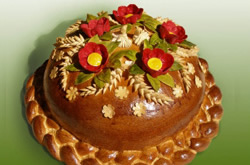 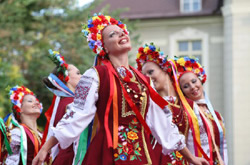
Ukrainian dishes show a sophisticated simplicity based on pleasing combinations of fresh, pickled, and smoked ingredients. While cooking techniques are not complicated, dishes may contain a great number of ingredients and unusual combinations, such as shuba salad which combines pickled herring and beets. Food is neither highly spiced nor bland, it's skilfully seasoned to perfection. Bread, is of course the mainstay of the Ukrainian diet. The country's reputation as the Breadbasket of Europe is well deserved. The French writer Honore de Balzac, who lived in Ukraine for four years, counted 77 different ways of preparing bread. It is such a central part of the Ukrainian cuisine that there is a custom to give honoured guests and departing or arriving travellers bread with salt. This tradition is still used in welcoming ceremonies for dignitaries and other important persons.
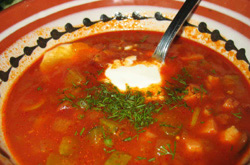
Borsch is certainly the national dish of Ukraine. This typically Ukrainian soup has been adopted by other countries in the region. The many versions of borsch served throughout the country reflect the individuality of Ukrainians, as well as their ingenuity. The beet-based soup can contain as many as 20 different ingredients, depending on the season, region, and of course, the personal preferences of the cook. It can be meatless or prepared with beef or smoked pork.
The availability of ingredients for traditional cooking are often dependent on the season, so vegetables often make their appearance in certain dishes in their pickled form. Salads are very common, but rather than being lettuce-based, combinations of fresh, cooked, and preserved vegetables may be mixed with meat, cheese, or fish. With so many different recipes, the only constant salad ingredients are vinegar and mayonnaise. 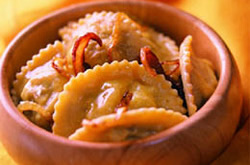
Varenyky
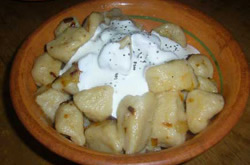
Galushkys
Varenyky are dumplings made from boiled or fried dough, resembling ravioli. They can be filled with meat, potatoes, cabbage, and sometimes mushrooms, but they can also be served as a dessert, with fillings of cherries or sweetened cottage cheese and raisins. Varenyky are being served with butter or sour cream on the side.
Galushkys are pastries made from different types of flour - wheat flour, buckwheat flour, or manna croup. It is possible to add cottage cheese, potato or apples. They are boiled in water, milk, or broth. Galushky are served either with fried onions and cracklings or with meat, poultry, fish, or pork dishes.
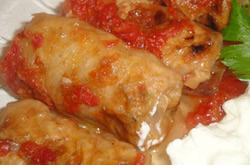
Holubtsi
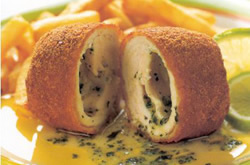
Kotleta po-Kievsky
Although, the Ukrainian word holubtsi means "little pigeons", in reality this delicious meal has nothing to do with fowl of any kind. They are cabbage rolls stuffed with meat and rice and often covered with a thin tomato sauce.
Known to the English-speaking world as Chicken Kiev, kotleta po-Kievsky is a chunk of boneless chicken stuffed with butter, then seasoned, floured, and deep-fried.
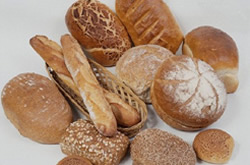
Khleeb is the Ukrainian word for bread. Sweet breads and rolls (bulochky) are made with honey and are often part of holiday or ceremonial meals. For example the Easter menu always includes Babka - a sweet egg bread, although it is being prepared throughout the year as well. Kalach is similar to babka, but more solid and in a circular shape. Paska is the official Easter bread, usually decorated and shaped into a cross. Korovay is tall, cylindrical traditional wedding bread. Pampushki can be fresh rolls soaked in crushed garlic and oil, or they can be fruit-filled baked rolls. Makivnik is a sweet poppy-seed bread flavoured with honey and molasses, typically prepared around Christmas. Khrusty are deep-fried strips of sweet dough coated with sugar, and medivnyk is a honey cake that stays fresh for weeks.
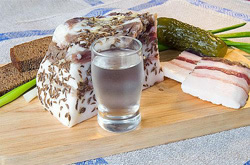
Alcohol is consumed in great quantities in Ukraine. It is often served during business lunches and dinners. It is expected that a man will be able to down a shot of vodka (horilka), although women may ask for wine or champagne instead. After every shot Ukrainians drink a glass of water or soda. Drinking toasts and rituals are very popular in Ukraine. Toasts are being proposed to health, friendship, success, love, and so on. Alcohol is very inexpensive and easily accessible but it is not safe to buy alcohol in public kiosks and/or on the street.. As everywhere else in the world it is illegal to drink and drive in Ukraine.
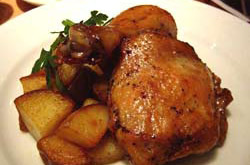
Ukrainians are also fond of poultry, especially stewed. Chicken and goose are some of the holiday favourites. Seafood is also very popular in Ukraine. Some of the famous Ukrainian fish dishes are: stuffed pike, stewed carp with onions and sour cream, pike with horse- radish, jellied pike and many more.
Pork is the most frequently used meat in Ukrainian cuisine. It includes a great number of pork recipes and meals - fried, baked and stewed pork, as well as pork sausages and various pork delicacies. But the perennial party favourite in Ukraine is Pechenya (stewed meat). But to say pechenya is just stewed pork would be very unfair. Pechenya is tender, tasty, succulent, fantastic.... Apart from the traditional recipe for pechenya, you can always use your imagination and throw in some of your favorite ingredients. Cooking pechenya takes a long time, but the outcome is all worth it!
There are plenty of fruits and berries that you can find in every garden in Ukraine! That is why there are numerous Ukrainian fruit desserts - varenyky, pyroghy, knedlyks, jellied berries, fruit babkas, and jams. There are also various fruit drinks, such as Uzvars, which is similar to fruit compote, but is much richer and more concentrated. It is a delicious mixture of raisins, prunes and spices- cinnamon, cloves, and dried citrus peel.
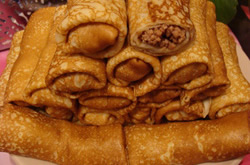
Blins
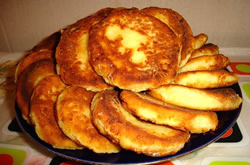
Syrniki
Blins are thin pancakes which are often served in connection with religious rites or holidays in some cultures. The word "blin" comes from the Old Slavic word mlin, that means "to mill". Blins had religious significance in pre-Christian times when due to their round form they were considered a symbol of the sun, They were traditionally prepared at the end of the winter to honour the rebirth of the new sun (Pancake week, or Maslenitsa). This tradition was adopted by the Orthodox church and is being carried on to the present day.
Syrniki (coming from the word "syr" - cheese) are fried cottage cheese cakes, garnished with sour cream, jam, honey, and/or apple sauce. They are made with full-fat, creamy cottage cheese, mixed with flour, egg, and sugar. The mixture is shaped into cakes, which are then being fried, generally in vegetable oil. The outside becomes crispy, and the core is warm and creamy. Syrniki are sweet and are being served for breakfast or dessert.
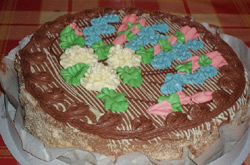
Another a local specialty is the so called Kievsky Tort , which is a cake, made of layers of crumbly wafers and hazelnuts. If you wish to try a uniquely Ukrainian drink, then you shoul try kvas - a slightly sweet non-alcoholic beverage with a wheat-like taste.
|

